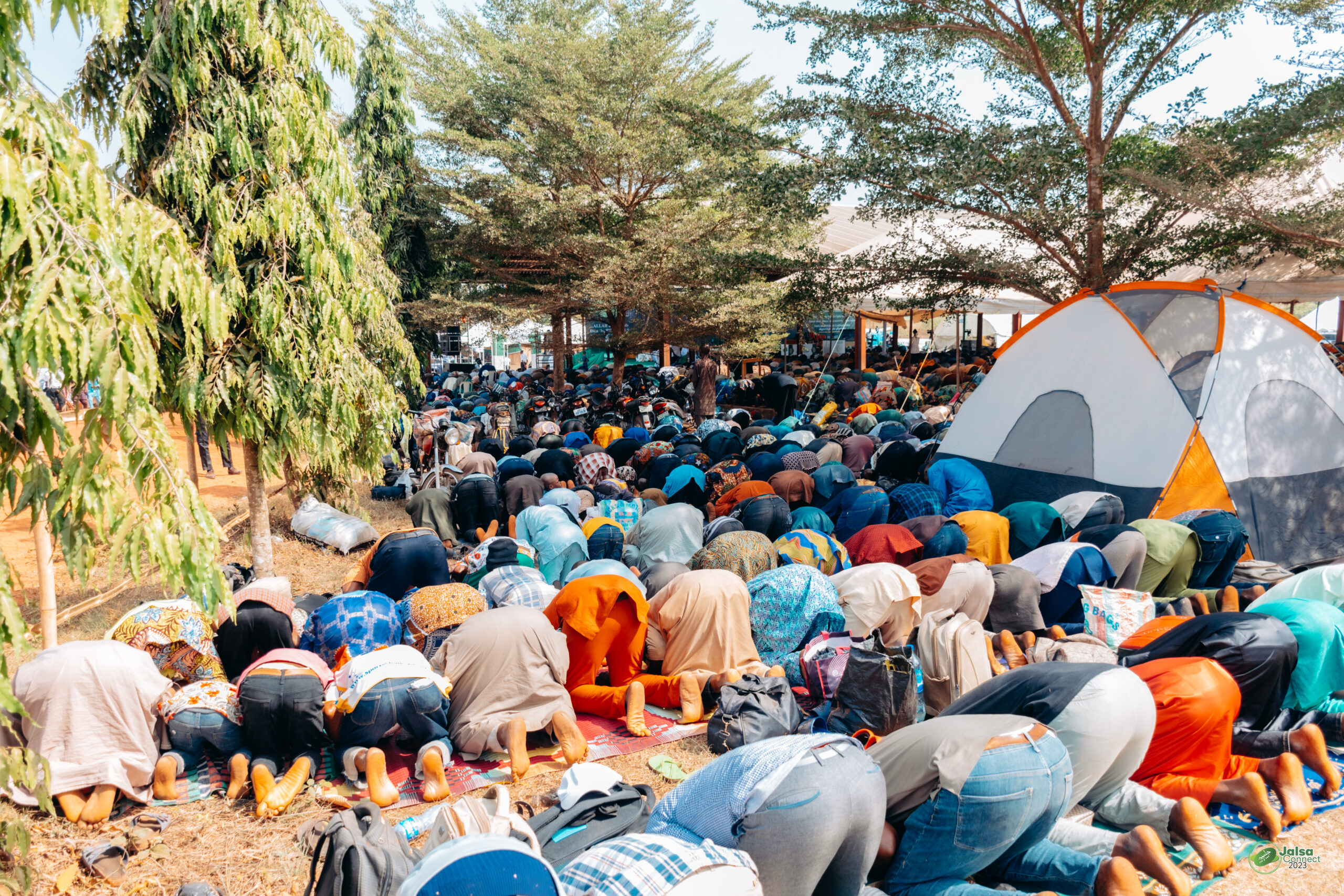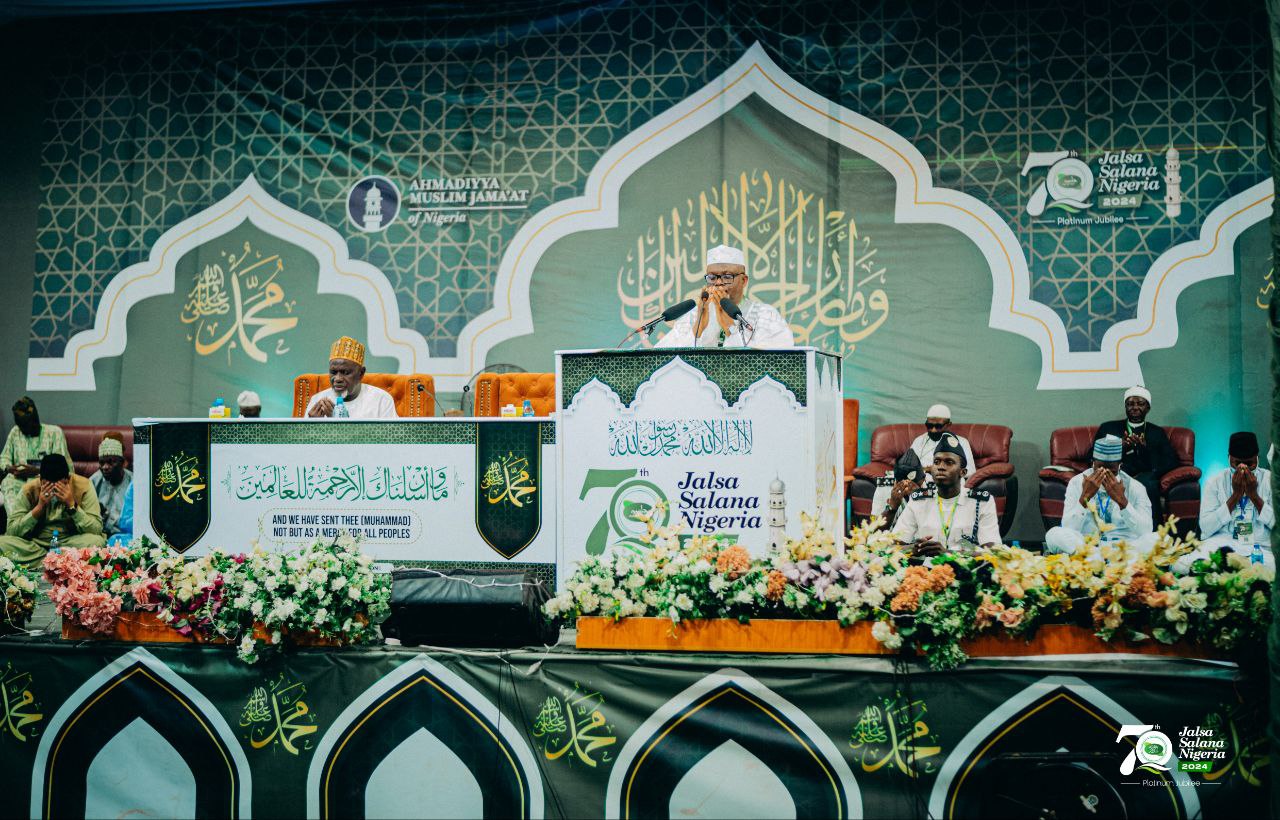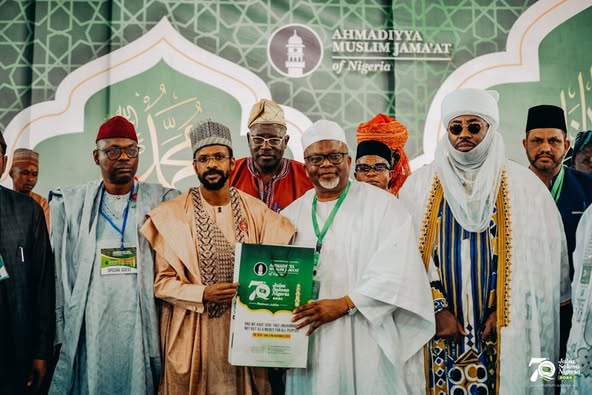By Habeebullah Akewugberu
I. Introduction
-Brief overview of Jalsa Salana and its significance.
Jalsa Salana is an annual international gathering of the Ahmadiyya Muslim Community, convened over three days in various countries worldwide. This blessed tradition was initiated in 1891, through Divine guidance, by Hazrat Mirza Ghulam Ahmad, the Promised Messiah and
Imam Mahdi, in Qadian, India. The inaugural event was humbly attended by approximately 70 devoted members.
Since its modest inception, Jalsa Salana has witnessed unprecedented growth and expansion, with the blessings of Allah. Today, this spiritual gathering is held in numerous countries, bringing together thousands of Ahmadis from diverse backgrounds. For three days, they converge in a spirit of brotherhood, dedicating themselves to spiritual rejuvenation, self-reflection, and communal bonding.
-Importance of spiritual gatherings in Islam.
As Allah says in the Holy Quran,
لَّا خَيْرَ فِي كَثِيرٍ مِّن نَّجْوَاهُمْ إِلَّا مَنْ أَمَرَ بِصَدَقَةٍ أَوْ مَعْرُوفٍ أَوْ إِصْلَاحٍ بَيْنَ النَّاسِ وَمَن يَفْعَلْ ذَٰلِكَ ابْتِغَاءَ مَرْضَاتِ اللَّهِ فَسَوْفَ
نُؤْتِيهِ أَجْرًا عَظِيمًا
‘There is no good in many of their conferences except the conferences of such as enjoin charity or goodness, or the making of peace among men. And who so does that, seeking the pleasure of Allah, We shall soon bestow on him a great reward." (Surah An-Nisa, Verse 115)
This verse highlights the significance of spiritual gatherings in Islam, emphasizing that not all gatherings are beneficial. Only those gatherings that promote charity, goodness, and peace-making are considered pleasing to Allah. Spiritual gatherings have been an integral part of
Islamic tradition since the time of the Prophet Muhammad (peace be upon him). These gatherings serve as a means of strengthening one’s faith, fostering a sense of community, and promoting spiritual growth.
Strengthening Faith
Spiritual gatherings provide an opportunity for Muslims to come together and strengthen their faith. Through collective prayers, recitation of the Quran, and spiritual discourses, individualscan rejuvenate their spiritual lives and deepen their connection with Allah.
Fostering Community
Spiritual gatherings play a vital role in fostering a sense of community among Muslims. By coming together, individuals can build relationships, promote unity, and develop a sense of belonging. This sense of community is essential in Islam, as it enables Muslims to support one another in their spiritual journeys.
Promoting Spiritual Growth
Spiritual gatherings offer a unique opportunity for Muslims to engage in self-reflection, spiritual
growth, and personal development. Through spiritual discourses, workshops, and mentoring sessions, individuals can gain a deeper understanding of Islamic teachings, develop their moral character, and cultivate a stronger sense of spirituality.
Examples from Islamic History
Throughout Islamic history, spiritual gatherings have played a significant role in promoting faith, community, and spiritual growth. Examples include:
1. The Prophet Muhammad's (peace be upon him) gatherings with his companions in Medina.
2. The annual Hajj pilgrimage, which brings together millions of Muslims from around the world.
3. The Jalsa Salana gatherings, which are held annually by the Ahmadiyya Muslim Community.
II. The Sacred Essence of Hajj
– Overview of the Hajj pilgrimage and its spiritual significance
The Hajj pilgrimage is a deeply revered and spiritually enriching experience in Islam, obligatory for those capable of undertaking it. This once-in-a-lifetime journey is a poignant reenactment of the sacred rituals performed by the illustrious prophets Abraham and Ishmael, whose unwavering faith and devotion continue to inspire generations of Muslims. The pilgrimage takes place in Mecca, Saudi Arabia, and is a celebration of unity, equality, and spirituality. Millions of Muslims from around the world come together, dressed in simple white garments, to perform rituals that promote humility, sacrifice, and devotion to God. The Hajj is a powerful reminder of
the oneness of humanity and the unity of the Muslim community.
The Spiritual Significance of Hajj.
The Hajj pilgrimage is a transformative odyssey that seeks to profoundly impact the individual’s spiritual landscape. This sacred journey offers a rare opportunity for introspection, atonement, and spiritual rebirth. As Muslims embark on this pilgrimage, they reconnect with their faith, seek divine forgiveness, and fortify their bond with the Almighty. Moreover, the Hajj serves as a poignant metaphor for life's journey, replete with its triumphs and tribulations. Through this experience, Muslims glean invaluable lessons on resilience, patience, and unwavering trust in God’s will. The transformative power of the Hajj is designed to resonate deeply within the individual, inspiring a lifelong commitment to living a virtuous, compassionate, and purpose-driven life.
The Universal Messages of Hajj.
The Hajj pilgrimage conveys profound universal messages that transcend cultural, racial, and national boundaries. At its core, the Hajj promotes values such as equality, justice, compassion, and kindness. It serves as a poignant reminder of the importance of caring for the poor, the needy, and the vulnerable. By emphasizing these values, the Hajj fosters a sense of unity and solidarity among Muslims, celebrating the diversity of human experience.
The Hajj pilgrimage is a powerful reminder of our shared humanity, created by one God and bound together by our common experiences. As Muslims from around the world come together to perform the rituals of the Hajj, they are reminded of their responsibility to care for one
another. The Hajj is a celebration of unity, equality, and spirituality that promotes values such as compassion, justice, and kindness. Through this transformative experience, Muslims are inspired to live a more righteous, compassionate, and meaningful life.
– Key elements of Hajj that promote spiritual growth and self-reflection
1. Ihram: Wearing simple, white garments to symbolize equality and humility.
2. Tawaf: Circumambulating the Kaaba to represent unity and devotion.
3. Sa'i: Running between two hills to commemorate Hagar's search for water.
4. Arafah: Spending a day in contemplation and prayer on the Mount of Mercy.
5. Stoning the Devil: Symbolically rejecting evil and temptation.
6. Qurbani: Sacrificing an animal to represent willingness to surrender to God's will.
7. Reflection and Repentance: Opportunities for self-reflection, seeking forgiveness, and
renewing one’s commitment to faith.
III. Jalsa Salana: A Mirror of Hajj
– How Jalsa Salana embodies the spiritual essence of Hajj
Jalsa Salana, the annual gathering of the Ahmadiyya Muslim Community, embodies the spiritual essence of Hajj in several ways:
1. Unity and Brotherhood: Like Hajj, Jalsa Salana brings together people from diverse backgrounds, fostering unity and brotherhood.
2. Spiritual Reflection and Growth: The gathering provides opportunities for spiritual reflection, self-improvement, and growth, similar to the transformative experience of Hajj.
3. Renewal of Faith: Jalsa Salana serves as a means of renewing one’s commitment to faith, much like the Hajj pilgrimage.
4. Promoting Peace and Harmony: The gathering promotes peace, harmony, and mutual understanding, reflecting the universal messages of Hajj.
5. Spiritual Rejuvenation: Jalsa Salana offers a chance for spiritual rejuvenation, much like the Hajj experience, where individuals can reconnect with their faith and seek spiritual guidance.
– Key features of Jalsa Salana that promote spiritual growth and self-reflection
Here are the key features of Jalsa Salana that promote spiritual growth and self-reflection:
1. Spiritual Discourses: Inspiring speeches and lectures by esteemed scholars and leaders, providing guidance on spiritual growth, self-improvement, and faith.
2. Prayer Sessions: Congregational prayers, including the five daily prayers and special prayers, fostering a sense of unity and spiritual connection.
3. Quranic Recitations: Beautiful recitations of the Holy Quran, promoting a deeper understanding and connection with the Word of God.
4. Self-Reflection and Introspection: Opportunities for individuals to reflect on their spiritual journey, acknowledging strengths and weaknesses, and seeking guidance for personal growth.
5. Interfaith Dialogue and Harmony: Sessions promoting interfaith understanding, tolerance, and peace, reflecting the Ahmadiyya Muslim Community’s commitment to global harmony.
6. Spiritual Workshops and Seminars: Interactive sessions and workshops focusing on spiritual development, character building, and faith-based topics.
7. Meetings with the Caliph: Opportunities for attendees to meet or listen to live address of the Caliph of the Ahmadiyya Muslim Community, seeking guidance, blessings, and spiritual advice.
8. Exhibition of Islamic History and Heritage: Displays showcasing Islamic history, art, and culture, promoting a deeper appreciation for the faith’s rich heritage.
9. Community Service Initiatives: Opportunities for attendees to engage in community service projects, fostering a sense of social responsibility and compassion.
10. Spiritual Counseling and Guidance: Access to spiritual counselors and mentors, providing guidance and support for individuals seeking to deepen their spiritual connection.
IV. Conclusion
– Final thoughts on the importance of spiritual gatherings in promoting spiritual growth and self-reflection.
Spiritual gatherings, such as Hajj and Jalsa Salana, hold immense significance in promoting spiritual growth and self-reflection. These events provide a unique opportunity for individuals to connect with their faith, reflect on their values and beliefs, and recharge their spiritual batteries.
By coming together with like-minded individuals, participants can experience a sense of community and belonging, which is essential for spiritual growth and development. Moreover, spiritual gatherings offer a chance for individuals to step away from the distractions of daily life and focus on their inner selves.
In today’s fast-paced and increasingly secular world, spiritual gatherings serve as a vital reminder of the importance of faith, spirituality, and community. By participating in these events, individuals work on themselves to cultivate a stronger sense of spirituality, foster deeper connections with others, and develop a more profound understanding of themselves and the world around them.
Hence, Jalsa Salana is a momentous event that embodies the spiritual essence of Hajj, the fifth pillar of Islam. This annual gathering provides a unique opportunity for Muslims to come together, reflect on their faith, and promote unity, peace, and harmony. Like Hajj, Jalsa Salana fosters a sense of community and belonging among Muslims from diverse backgrounds, promoting spiritual growth, self-reflection, and renewal of faith. As a celebration of Islamic values, Jalsa Salana reflects the universal messages of Hajj, including peace, harmony, and mutual understanding. Ultimately, Jalsa Salana serves as a powerful reminder of the transformative power of faith and community, inspiring Muslims to strive for a more righteous, compassionate, and meaningful life.





